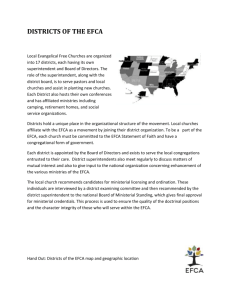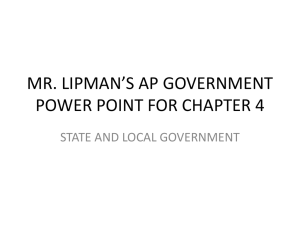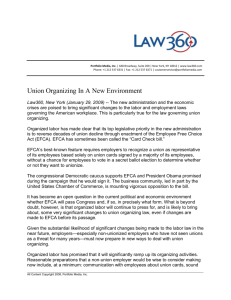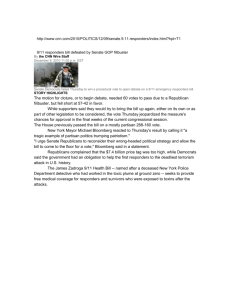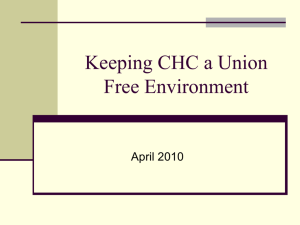EMPLOYEE FREE CHOICE ACT UPDATE
advertisement
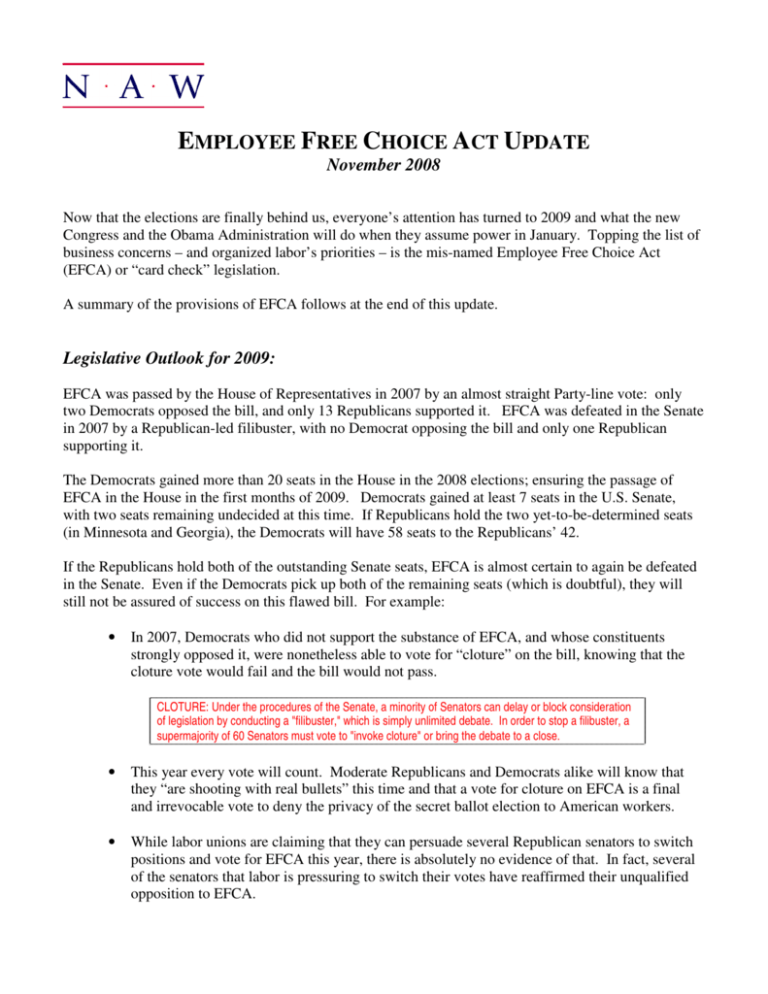
EMPLOYEE FREE CHOICE ACT UPDATE November 2008 Now that the elections are finally behind us, everyone’s attention has turned to 2009 and what the new Congress and the Obama Administration will do when they assume power in January. Topping the list of business concerns – and organized labor’s priorities – is the mis-named Employee Free Choice Act (EFCA) or “card check” legislation. A summary of the provisions of EFCA follows at the end of this update. Legislative Outlook for 2009: EFCA was passed by the House of Representatives in 2007 by an almost straight Party-line vote: only two Democrats opposed the bill, and only 13 Republicans supported it. EFCA was defeated in the Senate in 2007 by a Republican-led filibuster, with no Democrat opposing the bill and only one Republican supporting it. The Democrats gained more than 20 seats in the House in the 2008 elections; ensuring the passage of EFCA in the House in the first months of 2009. Democrats gained at least 7 seats in the U.S. Senate, with two seats remaining undecided at this time. If Republicans hold the two yet-to-be-determined seats (in Minnesota and Georgia), the Democrats will have 58 seats to the Republicans’ 42. If the Republicans hold both of the outstanding Senate seats, EFCA is almost certain to again be defeated in the Senate. Even if the Democrats pick up both of the remaining seats (which is doubtful), they will still not be assured of success on this flawed bill. For example: • In 2007, Democrats who did not support the substance of EFCA, and whose constituents strongly opposed it, were nonetheless able to vote for “cloture” on the bill, knowing that the cloture vote would fail and the bill would not pass. CLOTURE: Under the procedures of the Senate, a minority of Senators can delay or block consideration of legislation by conducting a "filibuster," which is simply unlimited debate. In order to stop a filibuster, a supermajority of 60 Senators must vote to "invoke cloture" or bring the debate to a close. • This year every vote will count. Moderate Republicans and Democrats alike will know that they “are shooting with real bullets” this time and that a vote for cloture on EFCA is a final and irrevocable vote to deny the privacy of the secret ballot election to American workers. • While labor unions are claiming that they can persuade several Republican senators to switch positions and vote for EFCA this year, there is absolutely no evidence of that. In fact, several of the senators that labor is pressuring to switch their votes have reaffirmed their unqualified opposition to EFCA. What you can do to help: While EFCA can be defeated in the Congress next year, business absolutely must stay engaged on the issue to ensure that outcome: • If you personally know your Representative or Senators, call them and urge them to vote NO; • If you do not know them personally, contact their state and/or district offices, tell them who you are and why you believe they should oppose EFCA, and urge them to vote NO; • Fax or email the Washington, D.C. office of your Representative and Senators with the same message; and • Remember that you should contact the Members of Congress who represent every state and Congressional District in which you have operations – you employ their constituents and voters everywhere you do business. NAW will send issue alerts and updates as the legislation moves through the Congressional process next year; it is critically important that every one of your voices is heard on Capitol Hill. Issue Summary: Current Law: Under current law, if a union conducting an organizing campaign obtains the signatures of 30% of the workers in a workplace indicating interest in being represented by a union, the employer may call for a Federally-supervised election in which all employees can vote by secret ballot on whether they wish to be represented by the union. Employee “Free” Choice Act: The Employee Forced Choice Act would dramatically change that process. If EFCA is enacted: • A union conducting an organizing drive would be immediately and automatically recognized as the certified collective bargaining agent if it is able to persuade 50 percent-plus-one of the employees in a workplace to sign authorization cards; • Workers would have to indicate publicly – to union organizers – whether or not they are willing to sign cards and employers could no longer insist on an election; • After a successful card check campaign, employers would have only 120 days to reach a collective bargaining agreement with the union. After 120 days, negotiations would be referred to a third-party arbitrator – with no responsibility for the economic health and profitability of the business – who would decide the terms of the agreement. And that agreement would be binding on the employer for two years; • New and severe penalties would be imposed on employers for “unfair labor practices,” with not a single new penalty on unions for similar violations; • Card check campaigns are very cost-efficient for unions, enabling them to spend little time and resources in the effort and making it practical for them to target small workplaces in weekendlong campaigns; and • Card check efforts allow the unions to organize using “unit manipulation” – a tactic by which they obtain cards from as many employees as possible in a short period of time (often over a weekend) and then sort the signed cards by job title or work assignment. If more than 50% of the workers in any subset within that workplace signed cards, the union submits just those cards and becomes the collective bargaining agent for that group of workers. Conclusion: Organized labor today represents only 7.4% of the private sector workforce. EFCA is labor's attempt to stop their declining membership by changing the rules at the expense of both employers and workers and tipping the scales in favor of the unions. We can and must defeat this ill-conceived legislation, and are counting on your involvement to help us do so.
